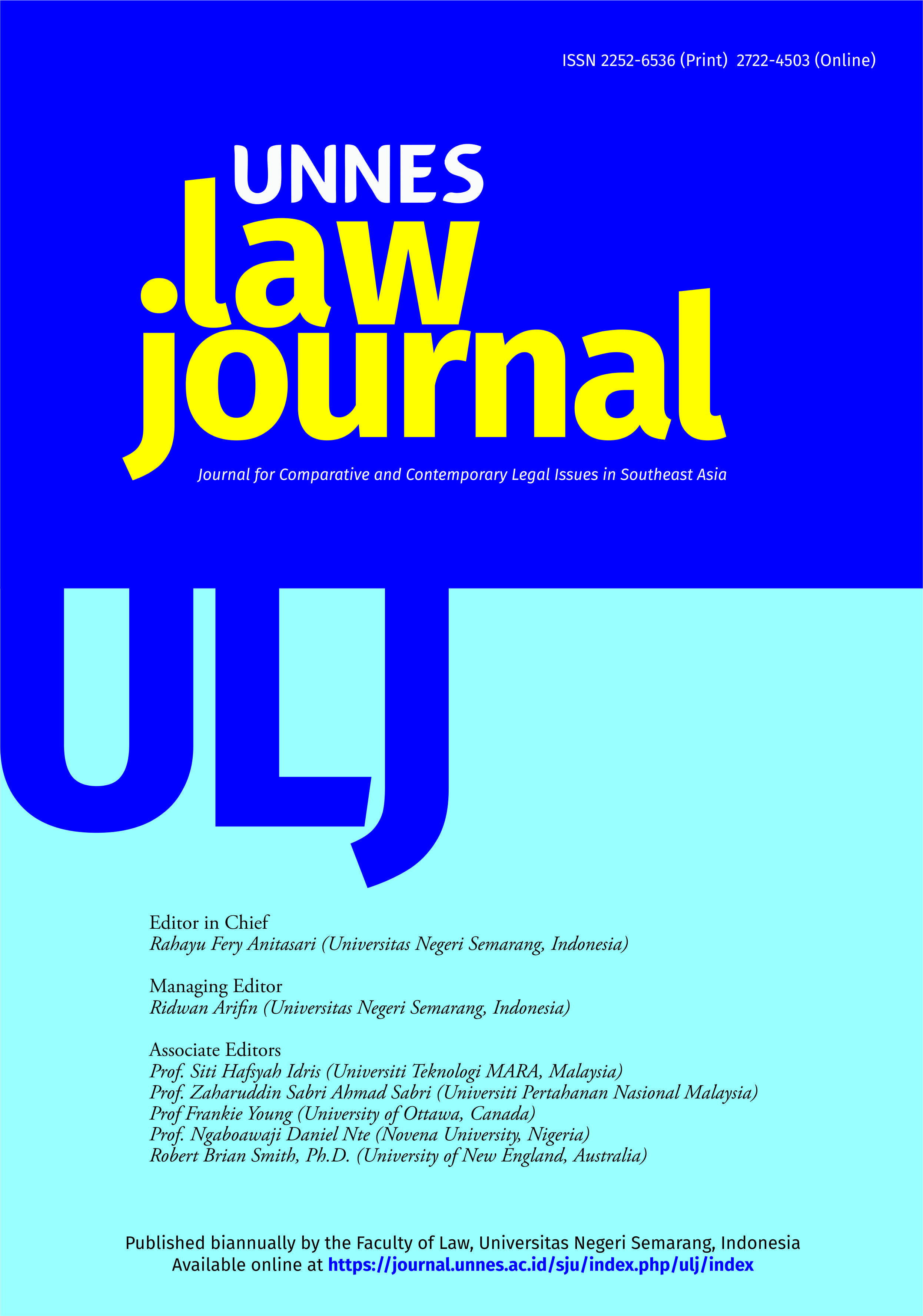Claims for the Rights of Third Parties in Good Faith Against Confiscation of Goods in Corruption Criminal Decisions
Main Article Content
Abstract
The judge has the authority to impose additional criminal decisions in criminal acts of corruption in the form of confiscation of goods belonging to third parties in good faith. Article 19 Paragraph (2) of the Anti-Corruption Law states that third parties who have good intentions can claim their rights (object) to the confiscation of goods in a corruption crime decision no later than 2 (two) months after the court decision is pronounced in a hearing open to the public. However, the Corruption Law does not clearly regulate how to submit and examine objections so that in practice there are differences in interpretation by the applicant, respondent and judge in submissions and examinations at trial, so that there is no guarantee of unity and certainty in the legal application of rights claims (objections) to confiscation of goods in the decision of criminal acts of corruption. The legal problem that arises is what are the regulations regarding the submission and examination of claims (objections) of third parties who have good intentions regarding the confiscation of goods in the decision of a criminal act of corruption? Regulations regarding the submission and examination of claims for the rights of third parties in good faith regarding the confiscation of goods in decisions regarding criminal acts of corruption, including the legal position of the parties, method and time of submission, authority to adjudicate, evidence, and legal remedies and implementation of the decision.
Article Details
References
Damanik, Kristwan Genova. “Antara Uang Pengganti Dan Kerugian Negara Dalam Tindak Pidana Korupsi.” Masalah-Masalah Hukum 45, no. 1 (2016): 1–10. https://doi.org/10.14710/mmh.45.1.2016.1-10.
Deshaini, Liza, and Muhammad Nur Amin. “Perlawanan Terhadap Perampasan Aset Yang Disita Dalam Perkara Tindak Pidana Korupsi.” Lex Librum: Jurnal Ilmu Hukum 9, no. 2 (2023): 117–128. http://dx.doi.org/10.46839/lljih.v9i2.767.
Effendy, Marwan. Kejaksaan RI: Posisi Dan Fungsinya Dari Perspektif Hukum. Gramedia Pustaka Utama, 2005.
Gunawan, Gunawan, Kristiwanto Kristiwanto, and Mohamad Ismed. “Pengaturan Tata Cara Pemeriksaan Upaya Keberatan Oleh Pihak Ketiga Pada Tindak Pidana Korupsi Di Indonesia.” SALAM: Jurnal Sosial dan Budaya Syar-i 8, no. 6 (2021): 2039–2050. https://doi.org/10.15408/sjsbs.v8i6.23411 .
Hamzah, Andy. Hukum Acara Pidana. Arikha Media Cipta, Jakarta, 2014.
Hernoko, Agus Yudha. Hukum Perjanjian: Asas Proporsionalitas Dalam Kontrak Komersial. Kencana, Jakarta, 2012.
Jati, Rosa Linda. “Perampasan Aset Sebagai Pidana Tambahan Dalam Pemberantasan Tindak Pidana Korupsi Di Indonesia.” Humani (Hukum dan Masyarakat Madani) 11, no. 1 (2021): 133–150. http://dx.doi.org/10.26623/humani.v11i1.2920.
Krisdianto, Krisdianto. “Implikasi Hukum Penyitaan Aset Hasil Tindak Pidana Korupsi Yang Hak Kepemilikannya Telah Dialihkan Pada Pihak Ketiga.” Katalogis 3, no. 12 (2015).
Mahendra, Yusril Ihza. Dinamika Tata Negara Indonesia: Kompilasi Aktual Masalah Konstitusi Dewan Perwakilan Dan Sistem Kepartaian. Gema Insani Press, Jakarta, 1996.
Mahfud, Moh. Perdebatan Hukum Tata Negara Pasca Amandemen Konstitusi. LP3ES, 2007.
Novianti, Tri, and Ricky Fadila. “Perlindungan Hukum Pihak Ketiga Atas Keberatan Putusan Pengadilan Terhadap Putusan Perampasan Barang Bukan Kepunyaan Terdakwa Dalam Perkara Tindak Pidana Korupsi.” PETITA 4, no. 2 (2022): 218–321. https://doi.org/10.33373/pta.v4i2.4973.
Pranoto, Agus, Abadi B. Darmo, and Iman Hidayat. “Kajian Yuridis Mengenai Perampasan Aset Korupsi Dalam Upaya Pemberantasan Tindak Pidana Korupsi Menurut Hukum Pidana Indonesia.” Legalitas: Jurnal Hukum 10, no. 1 (2019): 91–121. http://dx.doi.org/10.33087/legalitas.v10i1.158.
Saputra, Salim, and Rineke Sara. “Perlindungan Hukum Terhadap Pembeli Beritikat Baik Dalam Transaksi Jual Beli Yang Dibatalkan Karena Adanya Gugatan Pihak Ketiga (Studi Kasus Putusan Nomor 800/PDT.G/2013/PN.DPS).” Jurnal Ilmiah Huku, 1, no. 1 (2022). https://doi.org/10.37721/constitutum.v1i1.1135.
Sorejono, Soekanto, and Sri Mamudji. Penelitian Hukum Normatif. Radjawali Press, Jakarta, 1990.
Sutiyoso, Bambang, and Sri Hastuti Puspitasari. “Aspek-Aspek Perkembangan Kekuasaan Kehakiman Di Indonesia.” UII Press, Yogyakarta (2006).
Umara, Nanda Sahputra. “Pemisahan Pertanggungjawaban Perampasan Barang Dalam Penguasaan Pihak Ketiga Yang Beritikad Baik Dalam Putusan Tindak Pidana Korupsi.” Jurnal Hukum Novelty 8, no. 2 (2018): 232–251. http://dx.doi.org/10.26555/novelty.v8i2.a7027.
Wibowo, Tedhy. “Gugatan Pihak Ketiga Terhadap Eksekusi Barang Sitaan Dalam Perkara Tindak Pidana Korupsi.” Jurnal Magister Hukum Udayana (Udayana Master Law Journal) 7, no. 2 (2018): 238–249. https://doi.org/10.24843/JMHU.2018.v07.i02.p08.
Wibowo, Widyanti. “Perlindungan Hukum Pihak Ketiga Yang Beritikad Baik Dalam Tidak Pidana Pencucian Uang.” Doctoral dissertation, Universitas Airlangga (n.d.).
